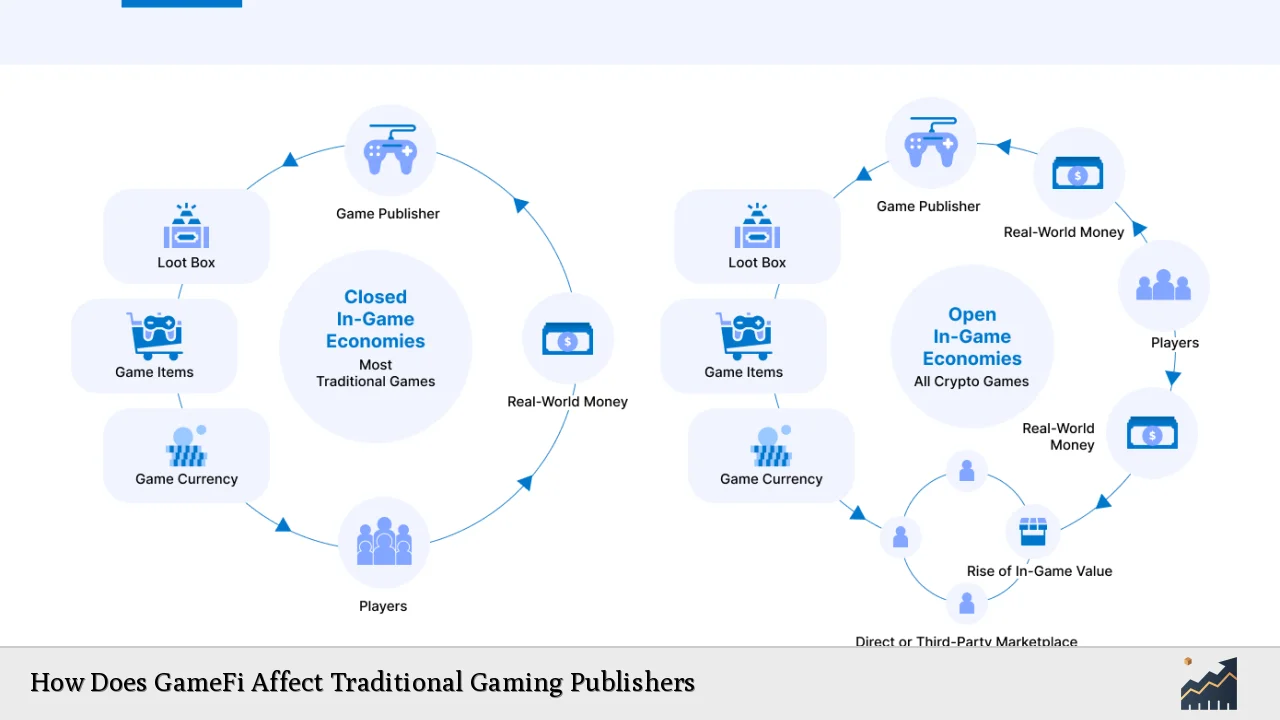The emergence of GameFi, a fusion of gaming and decentralized finance (DeFi), is reshaping the landscape of the gaming industry. This innovative model allows players to earn real-world rewards through gameplay, fundamentally challenging the established business models of traditional gaming publishers. As GameFi continues to gain traction, it presents both threats and opportunities for traditional publishers, necessitating a reevaluation of their strategies and operations.
| Key Concept | Description/Impact |
|---|---|
| Decentralized Economies | GameFi introduces decentralized in-game economies where players have control over asset values, challenging traditional publishers’ centralized control. |
| Player Ownership | Unlike traditional games, GameFi allows players true ownership of in-game assets via blockchain technology, impacting how publishers monetize their games. |
| New Revenue Models | The play-to-earn model shifts revenue generation from traditional sales to player-driven economies, forcing publishers to adapt their monetization strategies. |
| Increased Player Engagement | GameFi’s financial incentives enhance player engagement and retention, compelling traditional studios to innovate to keep players invested. |
| Global Market Expansion | Blockchain technology enables access to a broader global player base, presenting new market opportunities for traditional publishers. |
Market Analysis and Trends
The GameFi market has experienced explosive growth, with projections estimating its size to reach approximately USD 119.6 billion by 2031, growing at a compound annual growth rate (CAGR) of 29.5% from 2024. This growth is driven by the increasing adoption of cryptocurrencies and blockchain technology in gaming.
Current Market Statistics
- Market Size: The global GameFi market was valued at USD 9.6 billion in 2023 and is anticipated to grow significantly over the next decade.
- Regional Insights: North America leads the market with a projected revenue of USD 7.8 billion in 2024, followed by Asia-Pacific with USD 4.5 billion.
- Investment Trends: In the first quarter of 2023 alone, investments in blockchain gaming surged to USD 739 million, indicating strong investor confidence in this sector.
These trends highlight a shift in player expectations towards financial rewards and ownership, which traditional gaming publishers must address.
Implementation Strategies
For traditional gaming publishers to remain competitive amidst the rise of GameFi, they must adopt several strategic initiatives:
- Integration of Blockchain Technology: Publishers should explore partnerships with blockchain developers to incorporate decentralized features into their games.
- Adoption of Play-to-Earn Models: Transitioning from traditional monetization methods to play-to-earn models can attract players seeking financial incentives.
- Enhancing Player Ownership: By allowing players to own in-game assets as NFTs, publishers can create new revenue streams while fostering community loyalty.
- Leveraging Community Engagement: Engaging with players through decentralized governance models can enhance community involvement and satisfaction.
Risk Considerations
While embracing GameFi offers numerous benefits, it also presents several risks that traditional publishers must navigate:
- Regulatory Uncertainty: The evolving regulatory landscape surrounding cryptocurrencies and NFTs poses challenges for compliance. Publishers must stay informed about potential regulations that could impact their operations.
- Market Volatility: The value of in-game assets in decentralized economies can fluctuate dramatically, leading to potential financial losses for both players and publishers.
- Technological Barriers: The complexity of blockchain technology may deter some players from engaging with GameFi elements, limiting market reach.
Regulatory Aspects
The intersection of gaming and finance raises significant regulatory questions. Currently, there are no specific regulations governing GameFi; however, existing frameworks regarding securities and gambling may apply.
Key considerations include:
- Classification of Tokens: Proposed regulations may classify certain GameFi tokens as securities if they are perceived as investment vehicles.
- Tax Implications: Players may face tax liabilities on transactions involving digital assets, which could affect participation rates.
- Consumer Protection: Ensuring player safety and transparency in transactions will be crucial as the market matures.
Future Outlook
The future of GameFi appears promising but uncertain. As traditional gaming publishers adapt to this new paradigm, they must balance innovation with risk management.
Key Predictions
- Continued Growth: The GameFi market is expected to expand further as more players seek financial rewards from gaming experiences.
- Increased Collaboration: Traditional publishers may increasingly collaborate with blockchain companies to enhance their offerings.
- Evolving Player Expectations: Players will demand more transparency and ownership rights over their digital assets, pushing publishers towards more decentralized models.
Frequently Asked Questions About How Does GameFi Affect Traditional Gaming Publishers
- What is GameFi?
GameFi combines gaming with decentralized finance (DeFi), allowing players to earn real-world rewards through gameplay. - How does GameFi impact traditional revenue models?
GameFi introduces play-to-earn models that shift revenue generation from sales-based models to player-driven economies. - What are the risks associated with adopting GameFi?
Risks include regulatory uncertainty, market volatility, and technological barriers that may limit player engagement. - How can traditional publishers adapt to GameFi?
Publishers can integrate blockchain technology, adopt play-to-earn models, enhance player ownership through NFTs, and engage communities more effectively. - What regulatory challenges does GameFi face?
The lack of specific regulations around GameFi creates uncertainty regarding token classification and consumer protection laws. - Is there a growing demand for blockchain-based games?
The demand for blockchain-based games is increasing as more players seek financial incentives alongside entertainment. - What role do NFTs play in GameFi?
NFTs enable true ownership of in-game assets, allowing players to trade or sell them outside the game ecosystem. - What is the future outlook for GameFi?
The future looks promising with continued growth anticipated; however, traditional publishers must navigate various challenges as they adapt.
As the lines between gaming and finance blur further with the rise of GameFi, traditional gaming publishers face both challenges and opportunities that will shape the future landscape of the industry. Embracing innovation while managing risks will be crucial for success in this evolving environment.

